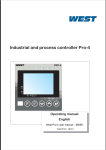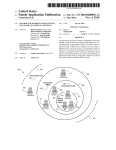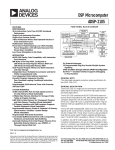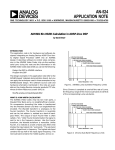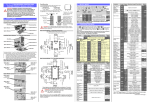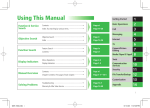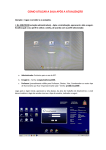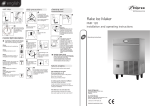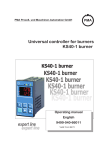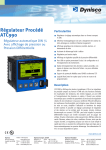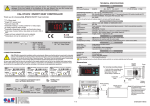Download ks 20-1/pro-16 industrial controller concise product manual 59533-1
Transcript
KS 20-1/PRO-16 INDUSTRIAL CONTROLLER CONCISE PRODUCT MANUAL 59533-1 Universal Input 1 and Digital Inputs 1 & 2: Status LED Indicators Manual mode is active Timer or profiler is active CAUTION: Installation should be only performed by technically competent personnel. Local Regulations regarding electrical installation & safety must be observed. The host equipment is required to provide a suitable electrical, mechanical and fire enclosure to meet relevant safety standards. Impairment of protection will occur if the product is used in a manner not specified by the manufacturer. Setpoint SP.2 or SP.E is in use Heat / valve open output is active Cool / valve close output is active Alarm is active 1. INSTALLATION Panel-Mounting The mounting panel must be rigid, and may be up to 6.0mm (0.25inch) thick. Cut-out sizes: Options 1, 2 and 3: Operator screens In operator mode the unit displays the key screens for controller operation. Two screens for the controller (PV with setpoint or output value) and one for the profiler (if configured). The operating level can be expanded with an “Extended operating level” Furthermore the user can access the “function level” with the F-key. B Cut-out Dim A /16 DIN = 45mm 1 Cut-out Dim B /16 DIN = 45mm 1 For n multiple instruments mounted side-by-side, cut-out A is 48n-4mm. Behaviour after power-on After the supply voltage is switched-on, the unit starts in the operator mode. The unit will be in the condition in which it was before power-off. If the controller was in manual mode before power-off, the controller starts with the last output value before power-off. A Tolerance +0.5, -0.0mm Loc rem Local-operation adjustment via front-panel possible Remote-operation adjustment via front-panel not possible blc.P blc.C u.blc Configuration-, parameter and calibration-level blocked Configuration-level blocked All blocking cancelled After opening the list the display will show the actual setting of the first section. Use the ENTER key to scroll to the next section and UP/DOWN-Keys to select functions. To activate the selected setting press ENTER or just wait 2 seconds before proceeding to the next screen. Example: Select setpoint SP.2 Press the F-key (display will show Err) Press ENTER until you see SP, SP.E or SP.2 Select SP.2 with the UP/DOWN-Keys Press ENTER to activate Press the F-key to leave the function level Self-tuning If the permissions in the configuration menu allow, self-tuning can be initiated by simultaneously pressing the UP and ENTER key. The lower display line will toggle between the setpoint and the self-tuning state. Press the same keys to abort an active self-tuning. Please refer to the full manual to learn about the meaning of the state messages and see the different optimization methodologies available. See the full user manual for details. Download at: http://www.west-cs.com/products/models/pro-16-single-loop-controller 1. Insert instrument into the panel cut-out. Mounting Panel Instrument Housing Ratchets Gasket 2. Hold front bezel firmly (without pressing on display area), and re-fit mounting clamp. Push clamp forward, using a tool if necessary, until gasket is compressed and instrument held firmly in position. 4. PROFILER OPERATION Operating the Profiler The F-key opens the profiler control menu in the lower display line. The display will show “P:” followed by the actual state. Depending on the configuration, the menu allows the user to select run/stop or run/stop/reset with the UP/DOWN-keys. Press ENTER to make the selected state active. Option A: CAUTION: For an effective IP65 seal against dust and moisture, ensure gasket is well compressed against the panel, with the 4 tongues located in the same ratchet slot. OFF Stop run It is essential that the controller is installed with a minimum of 20mm of free space around the case in order to allow adequate ventilation. Stop program execution and reset Stop program execution Start program execution The profiler start screen is shown above. The upper display line shows the program or segment execution time. The lower line shows the program-number or segment-number and the state of the profiler. Details for both lines can be configured. Rear Terminal Wiring All connections to the device must be made through a spade format or similar connection, with connection to the spade terminal touching both the insulation and conductor material. (Use a standard crimping tool). All connections must be mechanically secured so as to prevent any wiring becoming loose and coming in contact with other wires or the instrument casing. The above applies to any and all connection to hazardous mains supply either direct or indirect (through a switch or relay) Use copper conductors (except for T/C Inputs) Use Screened Cable on Retransmission Options Single Strand wire gauge: Max 1.2mm (18 SWG) Cabling must have a minimum temperature rating of 80 deg C. CAUTION: Check information label on housing for correct operating voltage before connecting supply to Power Input Fuse: 100 – 240V ac – 1A anti-surge 10A breaking capacity at 250V 24V ac/dc – 315mA anti-surge 3.5A breaking capacity at 48V Electrical shock can result in death or serious injury. Avoid contact with the leads and terminals. High voltages that may be present on leads can cause electrical shock Note: At first power-up please check that settings of input and output usage fit to your needs and wiring. The content of the extended operating level and the function level is based on configurations made with the configuration utility BlueControl. Parameters used frequently or important measured values can be placed into the extended operating level. See the full user manual for details. Download at: http://www.west-cs.com/products/models/pro-16-single-loop-controller 3. CONTROLLER OPERATION This is the start screen in controller mode. The upper display line always shows the process value. The lower line is used for the setpoint. 2. FRONT PANEL AND OPERATION BASICS A second screen shows the output value in the lower line. The status line has six LED beacons which indicate the following (left to right): controller in manual operation, timer or program is active, alternative setpoint used, heat mode active or valve open, cool mode active or valve close and limit alarm active. Assignment of connectors to options modules: Changing the setpoint The setpoint can be adjusted by pressing the UP/DOWN-keys. Control Functions The F-key opens the function list in the lower display line. Depending on configurations (LOGI) the list contains the following groups of parameters: 1. Process value display 2. Set-point, controller output or parameter 3. Status LED indicators – see next column 4. Ramp gradient is active 5. F-key to alter or activate functions 6. UP/DOWN to change set-point or controller output value 7. ENTER to accept value and show next screen Screen sequence shown below: Err Ereset No reset of the error list Resetting the error list SP SP.E SP.2 Internal setpoint active External setpoint active Second setpoint active On Off Controller/Signaler and Limit 1 are active Controller/Signaler and Limit 1 are switched off Auto Man Automatic operation Manual operation Program/segment selection Prerequisite: Programmer is in the reset or stop condition and program / segment selection (Pr.no / Pr.SG) is set in the extended operating level. The procedure to select a defined program (Pr.no) followed by a segment (Pr.SG) is shown below. When starting the programmer now, program operation starts at the beginning of the selected segment in the selected program. Lim: End: End of Program The last setpoint remains active Search run at programmer start The programmer starts the first segment at the actual process value (search run). This may change the effective runtime of the first segment. See the full user manual for details. Download at: http://www.west-cs.com/products/models/pro-16-single-loop-controller 5. ALARM MESSAGES In case of an alarm the lower display line will toggle between red and green and an alarm screen will be added to the list of operator screens. Navigate to the alarm screen by pressing the ENTER-key. You will find one of the following messages: Alarm Fbf.1/2/3 General Profiler Overview Programs Control outputs Segments Segment types Time units Maximum segment duration Maximum program duration Gradient Program name Bandwidth control 16 4 16 per program ramp (set-point and time) ramp (set-point andv gradient) hold segment (holding time) step segment (with alarm suppression) end segment All segment types can be combined with ”Wait at the end and call operator” configurable in hours:minutes or minutes:seconds 9999 hours = 1 year 51 days 16 x 9999 hours = > 18 years 0.01°C/h ( /min) to 9999°C/h ( /min) 8 characters, adjustable via BlueControl software bandwidth high and low (b.Lo,b.Hi) limits definable for each program Description Feedback failure Input 1/2/3 Sht.1/2/3 Short circuit Input 1/2/3 POL.1/3 polarity reversal Input 1/3 HCA Heater current alarm SSr Solid state relay LooP Loop alarm AdA.H Adaption Heat Ada.C Adaption Cool Lim. 1/2/3 Limit alarm Inf.1 Info service interval (life time counter) Inf.2 Info service interval (relay cycle counter) E.1 Hardware problem E.2 Internal problem E.4 Option module problem Corrective Action Check sensor and wiring Check input wiring Check input wiring Contains alarm limits When in a sub-section, the display will toggle between the parameter name and its value. Use the UP/DOWN-keys to change settings and ENTER to move to the next parameter. When at the end of a sub-section the display will show “done” and then the next sub-section name. At the end of the sub-section list the display will show “End” and return to the operator level. See the full user manual for details. Download at: http://www.west-cs.com/products/models/pro-16-single-loop-controller Note: It is highly recommended that the controller is used in conjunction with the BlueControl configuration utility. This will increase ease of use, save setup time and help prevent controller malfunction. A demonstration version of the BlueControl configuration utility is available as a free download from http://www.west-cs.com. The full “Expert” version is available to purchase from your local dealer. 7. SPECIFICATION INPUTS Check heating element and wiring Check SSR and output circuit Check fuses, heaters and wiring refer to auto tuning section in full manual refer to auto tuning section in full manual Check process Contact repair department /service centre Check for EMC issues Try power on reset Check option module fitting or contact repair department /service centre 6. SETUP AND CALIBRATION After power-up, the controller will show the operating level in the lower level text line. The controller status is retained and will be the same as before the last power-down. To access the options for parameter set-up, configuration and calibration, press ENTER for more than 3 seconds. This will now allow the options to be accessed: Use the UP/DOWN-keys to select the option and ENTER to go to the next option. Process Value Input INP1 Resolution: > 14 bit Decimal point: 0 to 3 decimal places Digital input filter: adjustable 0.000...9999 s Scanning cycle: 100 ms Measured value correction: 2-point or offset correction Thermocouples Input impedance: 1 MΩ Effect of source resistance: 1 V/Ω Thermocouple types: B, C, D, E, J, K, L, N, R, S, T Resistance thermometer: PT100, PT1000, KTY 11-6 Cold junction compensation Max. additional error: < 0.5 K Sensor break monitoring Sensor current: ≤ 1 µA Operating sense configurable Resistance thermometer Connection: 3-wire Lead resistance: max. 30Ω Input circuit monitor: Break and short circuit Current and voltage signals Span start, end of span: anywhere within measuring range Scaling: Selectable -1999...9999 Linearization: 16 segments, configurable with BlueControl Decimal point: adjustable Input circuit monitor: 12.5% below span start (2mA, 1V) Resolution: > 14 bit Scanning cycle: 100 ms Accuracy: Better than 0.1% Heating current measurement via current transformer Measuring range: 0...30mA AC Scaling: adjustable -1999..0,000..9999 A Accuracy: 0.25% Remote setpoint measurement range Input resistance: approx. 120Ω Span: configurable within 0 to 20mA Scaling: adjustable -1999...9999 Input circuit monitor: 12.5% below span start (4..20mA 2mA) CONTROL INPUT DI1 & DI2 Examples of profiler displays: Profiler OFF. Program 01 selected Internal controller setpoint is active Profiler in run mode Program 02 or Segment 02 active Setpoint is ramping up “/” Sections: PROG: This is used to edit programs for the profiler. PARA: This allows access to the two sets of PID parameters, setpoint limits, scaling of input signals, alarm limits and the program selection. . CONF: Used to select the controller function, activate the profiler, to set input types, to choose alarm functions, to assign functions to outputs and to configure the user interface. CAL: This section is used for calibration of the process inputs. After choosing a section the display will show the first option of the sub-section. Use the same procedure to choose and enter the desired sub-section. Sub-sections: (for example PARA) Cntr: Contains PID parameters. Par.2: Contains a second set of PID parameters. Setp: Contains setpoint limits Inp.1: Contains scaling and input filter Inp.2: Contains scaling Configurable as direct or inverse switch or push-button. Connection of a potential-free contact suitable for switching “dry“ circuits. Switched voltage: 3.3V Switched current: < 10mA CONTROL INPUTS DI3 & DI4 (OPTIONAL) These inputs (if ordered) are in the option A position and are configurable as direct or inverse. Nominal voltage: 24 V DC, external current sink (IEC 1131 Type 1) Logic “0”: -3...+5V Logic “1”: +15...+30V Current requirement: approx. 5mA OUTPUTS Relay – option 1-3 Contacts: Max contact rating: Min contact rating: Duty cycle: Potential free changeover 2A@ 250V 48…62Hz 6V, 1mA I = 1A/2A, 250,000/150,000 operations @ 250V resistive Dual relay – option 2 Contacts: 2 NO contacts with shared common Max contact rating: 2A@ 250V 48…62Hz Min contact rating: 6V, 1mA Duty cycle: I = 1A/2A, 500,000/200,000 operations @ 250V resistive SSR - option 1-3 Voltage: 10V into 500Ω minimum Dual SSR - option 1-3 Voltage: 10V into 500Ω minimum Linear DC output option 1 & 3 (1) Current output 0/4mA...20 mA, configurable. Signal range: 0...approx. 22mA Load: ≤ 500 Ω Load effect: none Resolution: (0.1%) Error: (0.2%) (2) Voltage output 0-10 V Signal range: Load: Resolution: Error: 0...11 V ≥ 2KΩ ≤ 0.1 % ≤ 0.2 % Bus interface - option 3 or option A Physical: RS485, at 1200, 2400, 4800, 9600 or 19200 bps. Protocol: Modbus RTU Communications Transmitter power supply Output: 22 mA / ≥ 18 V 8. ENVIRONMENTAL Operating Conditions (For indoor use) Ambient 0°C to 60°C (Operating), –20°C to 70°C (Storage). Temperature: Relative Humidity: 75% yearly average no condensation Supply Voltage and 100 to 240V AC ±10%, 50/60Hz, 11.5VA (mains voltage input Power: version) 24V AC ±10%, 50/60Hz, 11.5VA or 24V DC ±10%, 10W (low voltage input version) Certification Standards: EMI: CE, UL, cUL Complies with EN61326 (Susceptibility & Emissions). Complies with EN61010-1 Safety Pollution Degree 2, Installation Category II. Considerations: Front Panel Sealing: To IP65 (IP20 behind the panel). Physical 1 /16 DIN = 48 x 48mm. Front Bezel Size: Depth Behind Panel: 110mm. Weight: 0.21 Kg maximum. Cleaning If cleaning is necessary, the front panel should be cleaned by washing with warm soapy water and drying immediately using a dry, lint free cloth. Manufacturing site Address: The Hyde Business Park Brighton BN2 4JU United Kingdom Full user documentation More comprehensive user documentation is available in the full user manual which is available to download at: http://www.west-cs.com/products/models/pro-16-single-loop-controller Symbol Explanation Caution: general danger to life or limb


